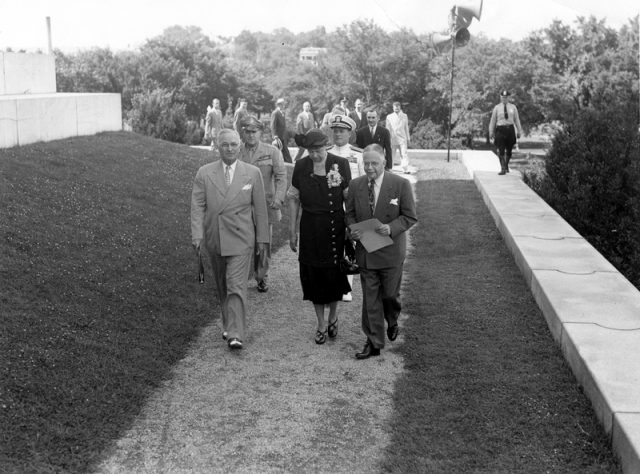
Much is made of values in
the rhetoric of Australia’s foreign and defence policies and in particular the consonance between Australian and American values as underpinning the ANZUS alliance. Presumably these values include racial equality; consent of the governed; equality before the law; optimal personal liberty; universal civil and human rights; freedom of speech, the press and religion; and secularism. The issue of racism throws a shadow on this supposed accordance.
The
President’s Committee on Civil Rights was established in 1946 by Executive Order 9808, which declared that ‘the preservation of civil rights guaranteed by the Constitution is essential to domestic tranquillity, national security, the general welfare, and the continued existence of our free institutions’. With this President Harry S. Truman had fired the first salvo in the post–World War II campaign for civil rights in America. Truman was motivated in part by the role civil rights would play in the building Cold War. The immediate trigger was a violent incident of racism.
In his 1948
special message to Congress on civil rights, Truman made clear the connection between the US’s international leadership and its commitment to upholding the constitutional rights of all Americans regardless of race. This was an ‘urgent’ matter at a time when ‘the peoples of the world are faced with the choice of freedom or enslavement, a choice between a form of government which harnesses the state in the service of the individual and a form of government which chains the individual to the needs of the state’.
For Truman living up to espoused democratic values and civil rights was inseparable from the international reputation and influence of the US. Truman wanted to cleanse American society of the worst manifestations of racism: lynching and disenfranchisement. Extra-judicial killing of African Americans had a long and bloody history in the US, especially in the post-Reconstruction era. America could not claim the moral high ground while lynching went unaddressed.
On 25 July 1946, Roger Malcolm, a 24-year-old African American on bail for stabbing a white man, was killed on the banks of the Apalachee River outside the town of Monroe, Georgia, along with his wife and another African American couple, George and Mae Dorsey, who were unconnected with the alleged crime. The four bodies had been shot 60 times by a group of unmasked men. No one was charged. It became a
cause celebre.
Jay P. Childers notes that ‘as horrible as the event was, racial violence in Georgia and across the South was commonplace, and multiple presidents and Congresses had failed to take serious action on lynching and other African American concerns for decades’. The 1946 Georgia lynching was ‘a threat to the entire nation, [and] hurt America’s image abroad’.
Lynching was the most violent racist reaction in the South following the emancipation and enfranchisement of former slaves after the Civil War. Across the former slave-owning states in the late 19th century, suffrage and citizenship rights were effectively denied blacks despite amendments to the US Constitution.
An active anti-lynching movement had emerged by the early 20th century and Jim Crow laws and disenfranchisement were simultaneously being tackled by civil rights activists. As with today, there were loud voices condemning racial injustices.
White supremacist views persisted beyond the Civil War and into today. Truman recognised that ‘not all groups enjoy the full privileges of citizenship and participation in the government under which they live’. It now seems almost inconceivable that Truman had to urge Congress in 1948 to take action to provide federal protection against lynching and to protect ‘more adequately the right to vote’. The advancement of civil rights in America has been a long and arduous fight. The civil war fought over slavery still reverberates through the Union.
Although racism appears to be an irreducible constant of American society, not all, not even a majority, of Americans hold racist views. A
recent survey of attitudes to race in the US revealed that 58% overall, and 71% of black respondents, say race relations are generally bad. Among blacks a majority thought President Donald Trump has made relations worse (73%) and that the legacy of slavery still affects the position of blacks in society (84%). Under Trump it has become more common (65%) and more acceptable (45%) to express racially insensitive views.
White Americans are divided in their views on racial equality, and political allegiance is a good indicator of attitude: 64% of Democrats think that blacks haven’t made enough gains in equality and 31% of Republicans think they have gone too far; 59% of Republicans believe slavery has no lingering consequences for blacks while 80% of Democrats believe it still has a significant impact.
Trump may or may not be a racist or a white nationalist, yet his lack of concern about behaviour that fosters an acceptance of prejudice and discrimination is obvious to internal and external observers. That impression is reinforced by a degree of indifference towards Puerto Rico following a hurricane, a reference to ‘shithole countries’, harsh border and immigration policies, virulent anti-refugee rhetoric, questioning the capacity of non-white congresswomen to be loyal citizens, and a reluctance to criticise white supremacists.
Racism remains entrenched and normalised for a significant minority of Americans and erupts when not strongly discouraged by political leaders. This matters because racial equality is perhaps the fundamental liberal value, partly because it affects most of the others.
At 175 centimetres, Truman was at least 10 centimetres smaller in stature than Trump; however, he towers above him as a national and international leader. Truman’s values were of a kind that demanded admiration and inspired followers. Trump evokes memories of a darker time.
[4] Jay P. Childers: https://www.researchgate.net/publication/314217563_Transforming_Violence_into_a_Focusing_Event_A_Reception_Study_of_the_1946_Georgia_Lynching
 Print This Post
Print This Post